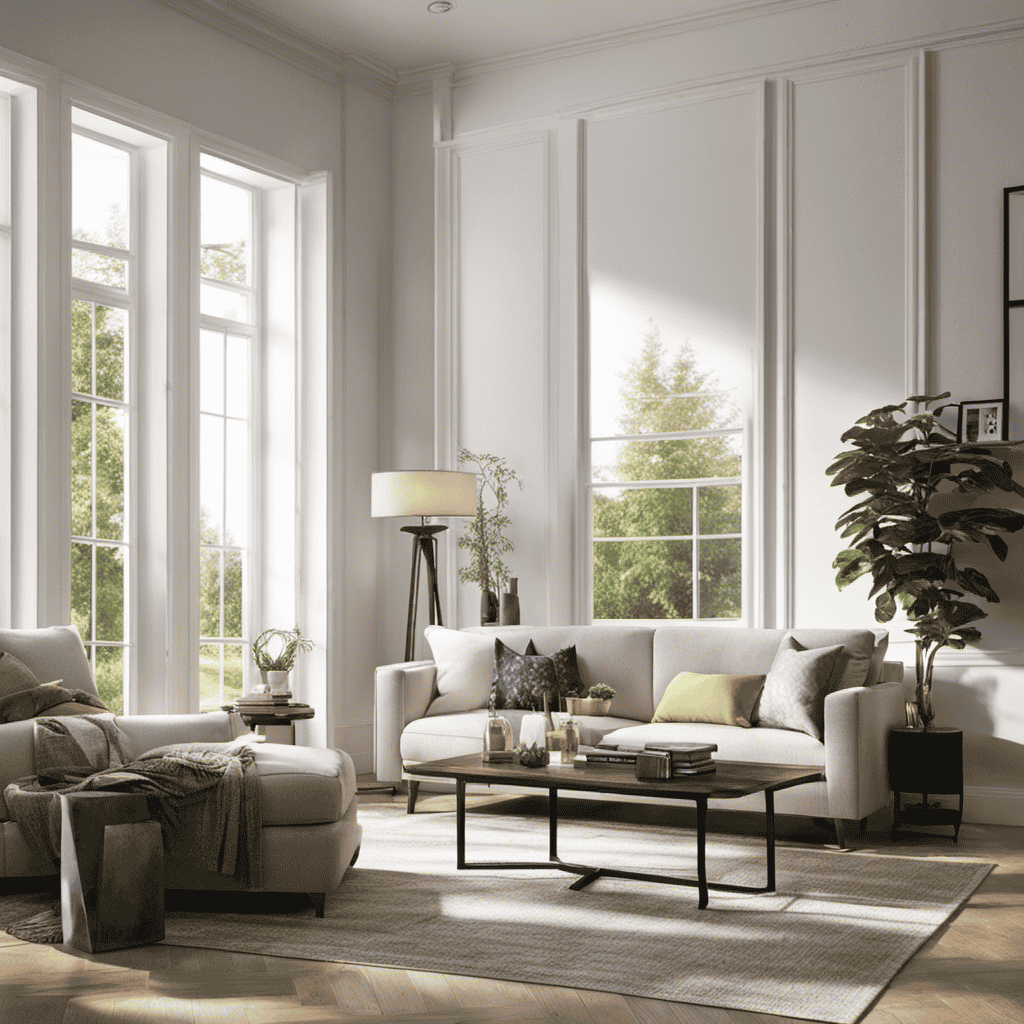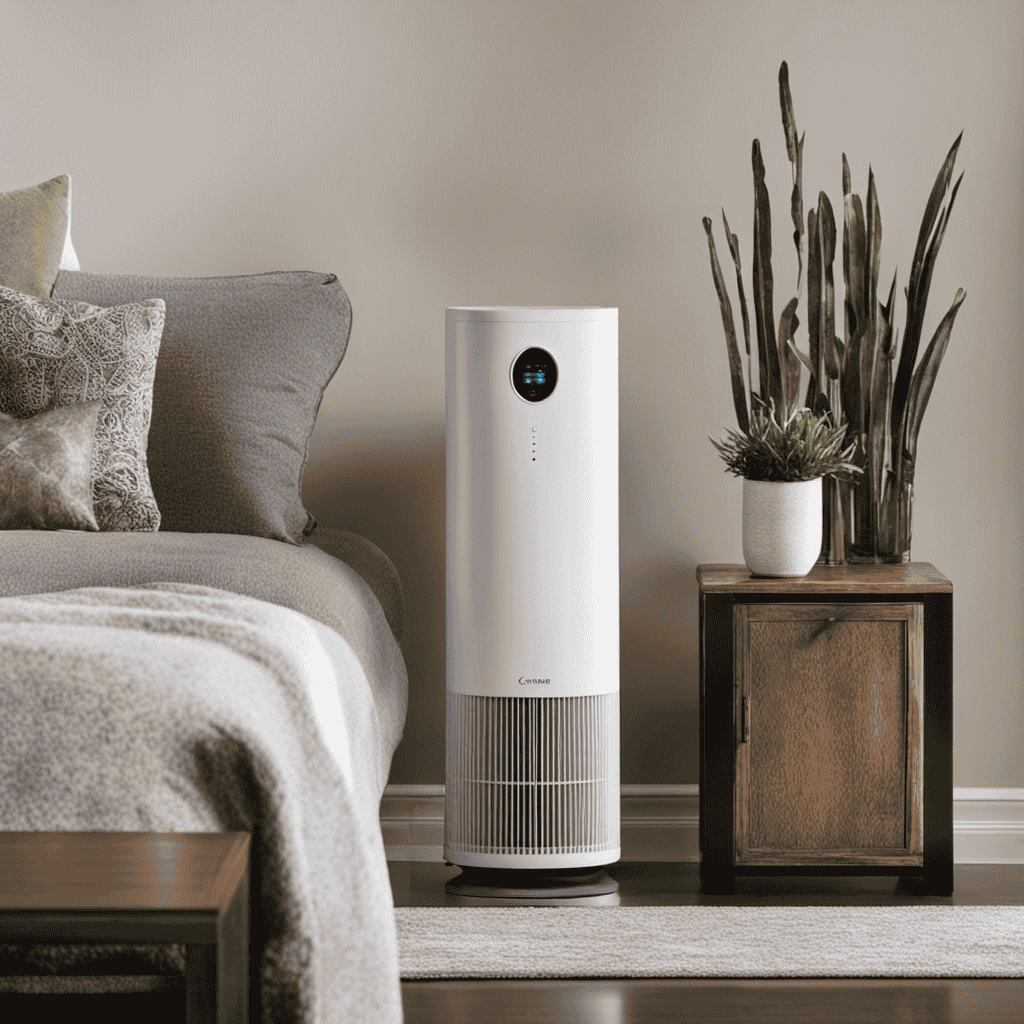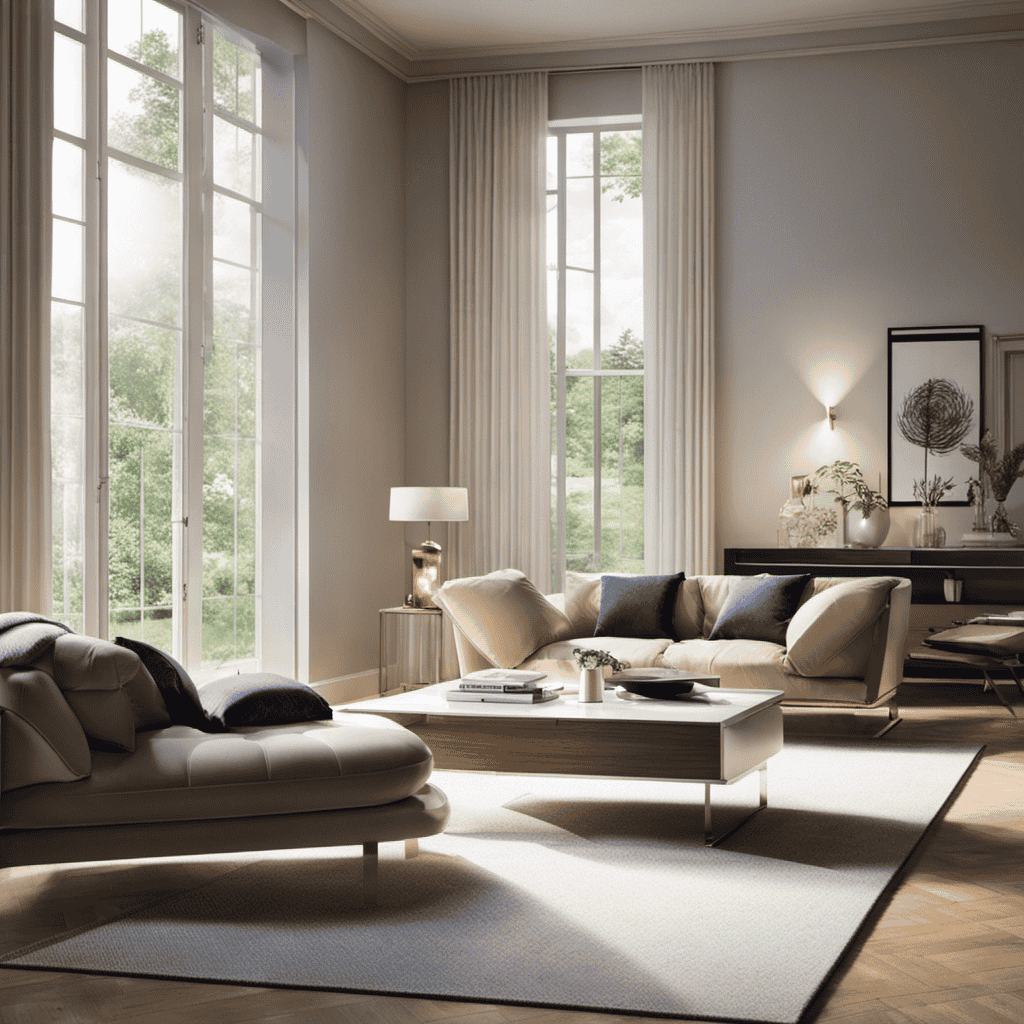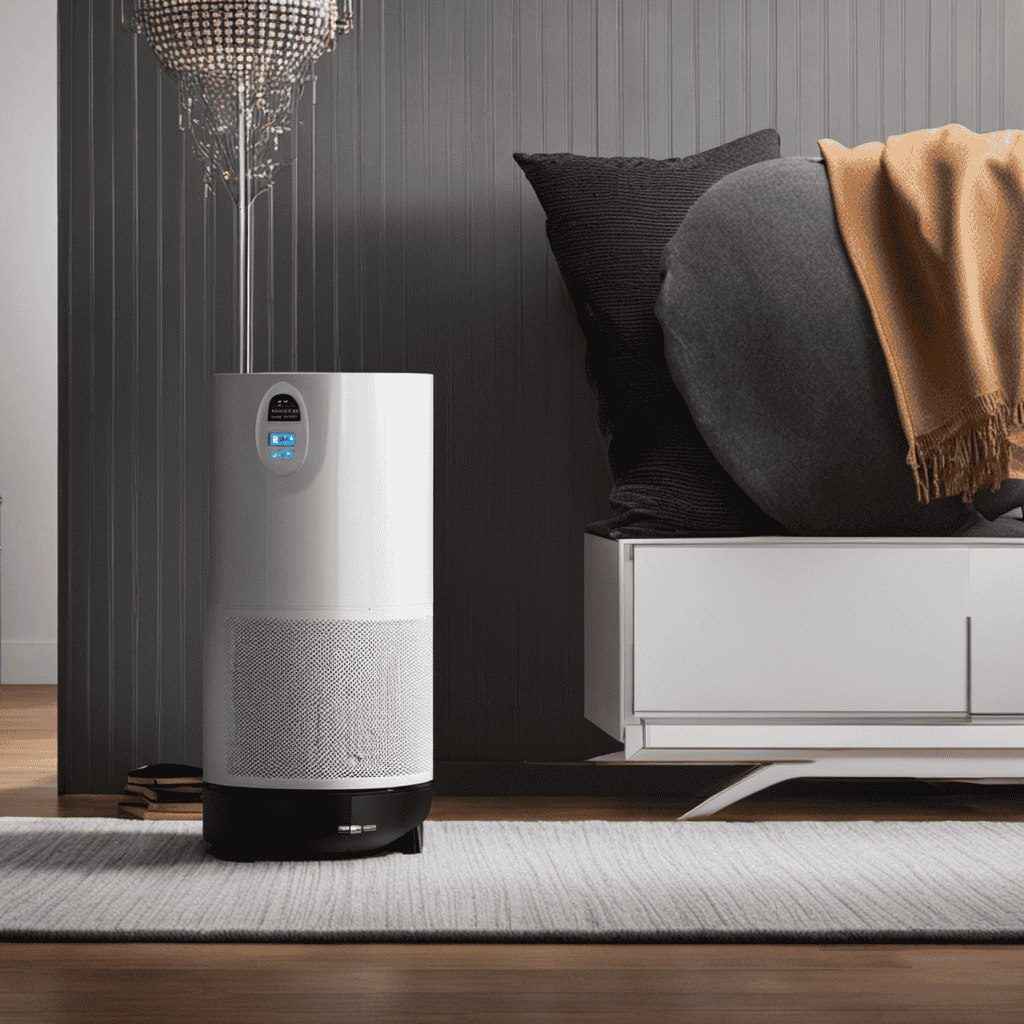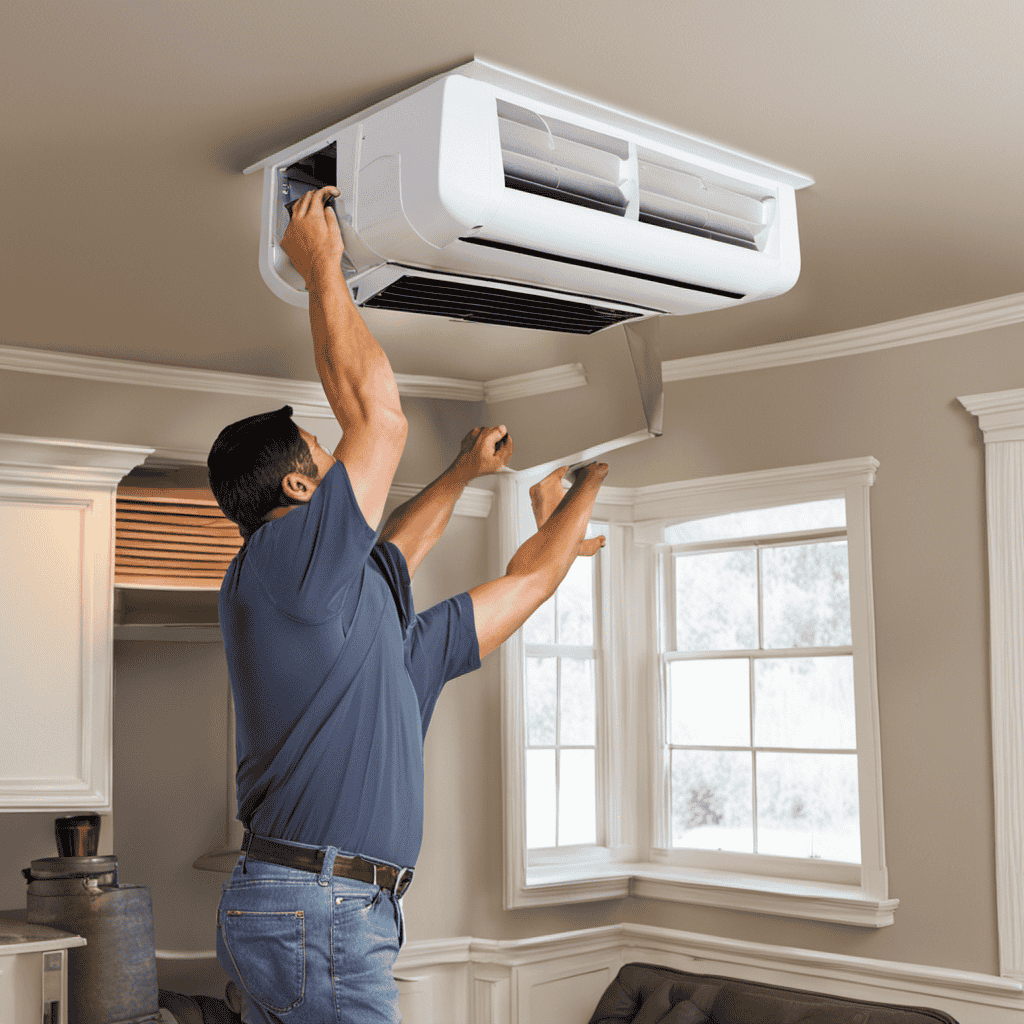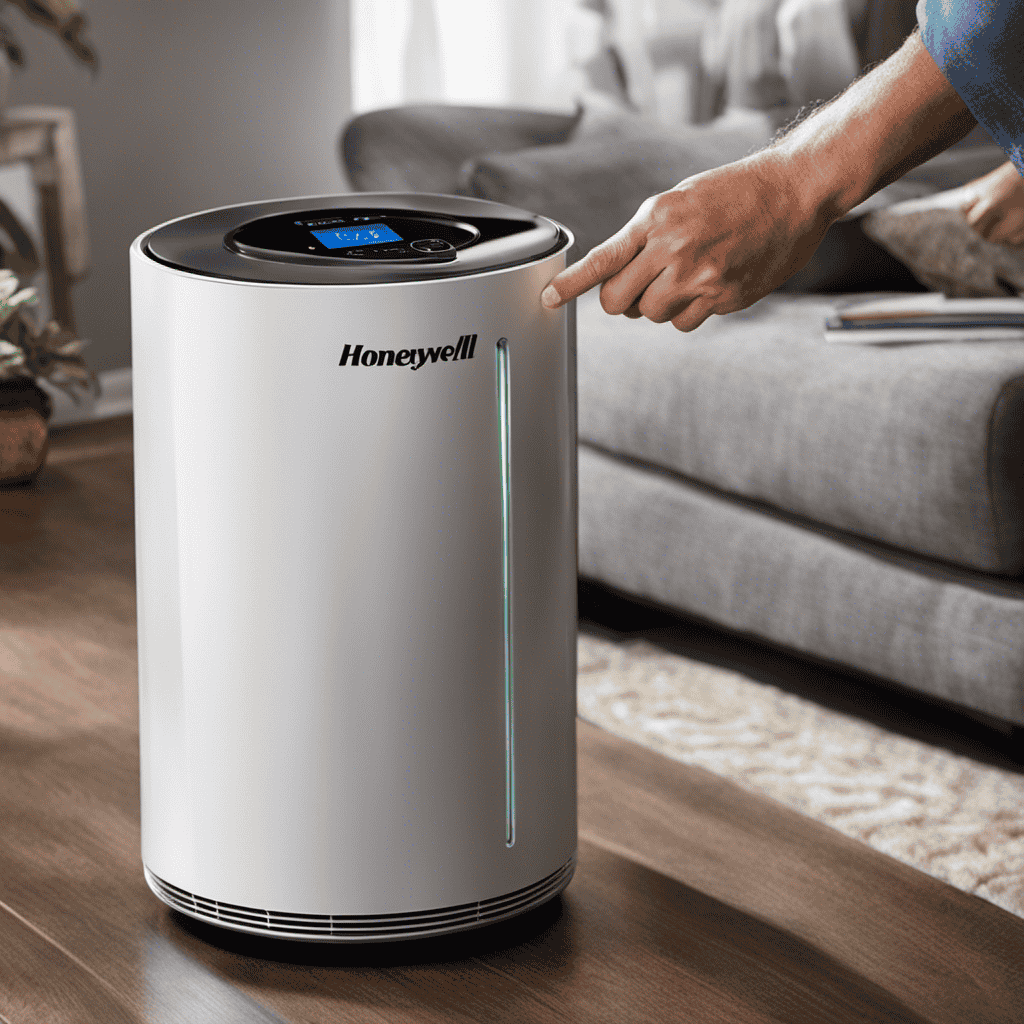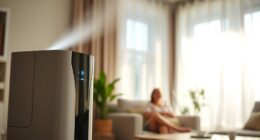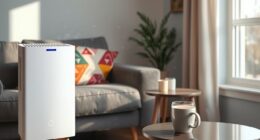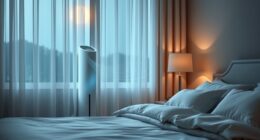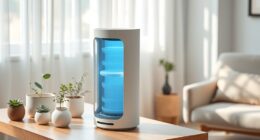Have you ever wondered about the frequency at which you should be running your air purifier? Don’t worry, I’ve got you covered.
In this article, we will explore the benefits of running an air purifier regularly and discuss the factors to consider when determining the frequency.
I’ll also provide you with recommended guidelines and signs that indicate your air purifier needs to run more often.
Plus, I’ll share some tips for maximizing the efficiency of your air purifier.
Let’s dive in and breathe cleaner air together!
Key Takeaways
- The frequency of running an air purifier should be determined by factors such as the size of the room, level of pollutants, and maintenance requirements of the purifier model.
- Larger rooms may require longer running times, and high pollution levels or specific indoor pollutants may necessitate more frequent use of the purifier.
- Regular cleaning and filter replacement are essential for optimal performance, as neglecting maintenance reduces efficiency and increases allergen buildup.
- Signs that indicate the need for running the air purifier more often include increased allergies, dust accumulation, and poor filtration or ventilation.
Benefits of Running an Air Purifier Regularly
Running an air purifier regularly can help reduce allergens and improve the overall air quality in your home. The effectiveness of air purifiers in removing airborne pollutants has been well-documented through scientific studies.
Air pollution, both indoor and outdoor, can have a significant impact on our health, leading to respiratory issues, allergies, and even cardiovascular problems. By continuously running an air purifier, you can ensure that the air you and your family breathe is free from harmful particles and pollutants.
These devices work by using filters or electronic methods to capture and eliminate airborne contaminants such as dust, pollen, pet dander, and even volatile organic compounds. Investing in a high-quality air purifier and using it regularly can provide long-term health benefits and create a healthier living environment for you and your loved ones.
Factors to Consider When Determining How Often to Run Your Air Purifier
When considering how frequently to use your air purifier, take into account various factors.
Factors to consider include:
- The size of the room
- The level of pollutants present
- The maintenance requirements of the specific air purifier model
Larger rooms may require longer running times to effectively purify the air, while smaller rooms may need less. Additionally, if the room is frequently occupied or if there are individuals with allergies or respiratory conditions, it may be necessary to run the air purifier more often.
Maintenance requirements such as filter replacement and cleaning should also be taken into consideration. Regularly checking and cleaning the filters is essential for optimal performance and longevity of the air purifier.
Recommended Frequency for Running an Air Purifier
Considering the recommended frequency for using an air purifier, it’s important to take into account various factors such as room size, pollutant levels, and maintenance requirements. Here are three key points to keep in mind when determining how often to run your air purifier:
-
Size matters: The size of your room plays a crucial role in determining the recommended frequency. Larger rooms may require longer running times to effectively clean the air, while smaller rooms may need less time.
-
Pollutant levels: If your home is located in an area with high pollution levels or if you have specific indoor pollutants like pet dander or smoke, you may need to run your air purifier more frequently to maintain clean air quality.
-
Recommended maintenance: Regularly cleaning and replacing filters is essential for optimal performance. Neglecting recommended maintenance can lead to reduced efficiency and increased allergen buildup.
Common misconceptions about air purifiers include thinking they only need to be run occasionally or that running them continuously is necessary. Understanding these factors will help you determine the recommended frequency for running your air purifier, ensuring clean and fresh air in your home.
Signs That Indicate Your Air Purifier Needs to Run More Often
To ensure optimal air quality in your home, it’s important to be aware of certain signs indicating that your air purifier may need to be used more frequently. Increased allergies and dust accumulation are two key indicators that your air purifier may not be running often enough. Allergies can be triggered by airborne particles such as pollen, pet dander, and dust mites, which can accumulate in your home if not filtered properly. Dust accumulation is a common problem in households and can worsen allergies and respiratory conditions. By running your air purifier more often, you can effectively reduce the number of airborne allergens and dust particles in your home, providing a cleaner and healthier environment for you and your family.
| Signs | Increased Allergies | Dust Accumulation |
|---|---|---|
| Indicators | Sneezing, coughing, itchy eyes | Visible dust on surfaces, frequent cleaning needed |
| Causes | Pollen, pet dander, dust mites | Lack of filtration, poor ventilation |
| Solution | Run air purifier more often | Increase frequency of cleaning, use air purifier regularly |
Tips for Maximizing the Efficiency of Your Air Purifier
A key tip for maximizing your air purifier’s efficiency is to regularly clean or replace the filters. This is because the filters play a crucial role in capturing and trapping airborne particles, such as dust, pollen, and pet dander.
Here are three important tips for cleaning your air purifier effectively:
-
Follow the manufacturer’s instructions: Each air purifier may have specific guidelines for cleaning and replacing filters. It is essential to read and follow these instructions to ensure proper maintenance.
-
Clean the pre-filter regularly: The pre-filter is the first line of defense against larger particles. By cleaning it regularly, you can prevent clogging and ensure optimal airflow through the purifier.
-
Use a vacuum or brush: When cleaning the filters, gently vacuum or brush away the accumulated dust and debris. Avoid using water or harsh chemicals, as they can damage the filters.
Common misconceptions about air purifiers:
-
Air purifiers can eliminate all indoor pollutants: While air purifiers can effectively remove many airborne particles, they may not eliminate all pollutants, such as gases and odors.
-
Air purifiers do not need regular maintenance: Filters in air purifiers need to be cleaned or replaced regularly to maintain their efficiency.
-
Air purifiers can replace proper ventilation: Air purifiers should complement, not replace, proper ventilation in your home. Opening windows and ensuring adequate airflow is still important for maintaining indoor air quality.
What is the Recommended Frequency for Running an Air Purifier?
The recommended air purifier run frequency depends on the size of the room and the air quality. For most rooms, running the air purifier continuously on a low setting is ideal. However, if the air quality is poor, it’s best to run the air purifier on a higher setting for a few hours each day.
Frequently Asked Questions
Can Running an Air Purifier Too Often Be Harmful?
Running an air purifier constantly may have potential side effects. These include dryness of the air, increased energy consumption, and accumulation of dust on the purifier’s filters. It is important to strike a balance for optimal air quality.
Are There Any Specific Health Conditions That Would Require Running an Air Purifier More Frequently?
As an air purifier enthusiast, I must say that running it more frequently can be beneficial for individuals with specific health conditions. Factors like location and environment can affect the recommended frequency.
How Does the Size of the Room Affect the Recommended Frequency for Running an Air Purifier?
The size of the room can affect the recommended frequency for running an air purifier. Larger rooms may require more frequent usage to effectively clean the air, while smaller rooms may need less frequent usage.
Can Running an Air Purifier at Night Affect Sleep Quality?
Running an air purifier at night may affect sleep quality due to the noise levels. However, air purifiers can effectively reduce allergies by removing airborne particles. It is recommended to use them during the day for optimal results.
Are There Any Specific Types of Pollutants That Require Running an Air Purifier More Frequently?
Specific types of pollutants, such as allergens, smoke, and pet dander, may require running an air purifier more frequently. The frequency of running an air purifier depends on the level of these pollutants in the environment.
Conclusion
In conclusion, running an air purifier regularly is crucial for maintaining clean and healthy indoor air. By filtering out pollutants and allergens, it acts as a shield, protecting us from the invisible enemies that threaten our well-being.
Just like a diligent guardian, it tirelessly works to create a sanctuary of purity in our homes. So, let us embrace its power and let it run freely, purifying the air we breathe.
